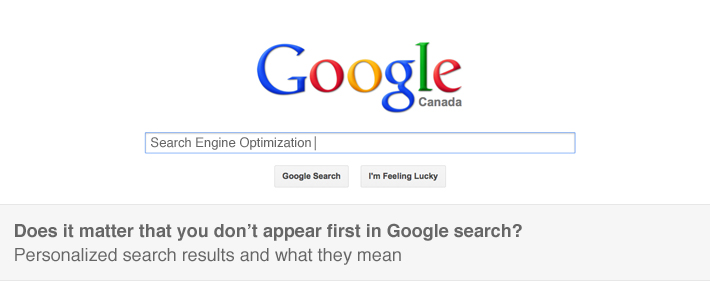
“We’re the 3rd Google result for our industry.”
We work with companies to help them understand Search Engine Optimization (SEO). Often, we hear some variation of the quote above. Many gauge their SEO success based on checking a personal computer to see where they rank in keyword searches.
This is problematic.
Google uses complex algorithms and personalized search results to determine which results appear. Google automatically takes a variety of your personal information, such as, your location, search history, browser choice and so on, to determine what results appear. When using Google search,your results are customized for you. Someone on another street, in another city or in another country is seeing different search results when searching the exact same words. A friend had recently done considerable research for an upcoming vacation. When we asked her to Google ‘Turkey’, her results were mostly about tourism options in that country. Another friend is interested in politics and world conditions. His results came up with information about politics and civil unrest in Turkey. Although they both searched for “Turkey”, the results were different.
How does this apply to businesses? Let’s say you own a business and want to improve your company’s SEO. When checking search results on your personal laptop, what will Google see? Let’s check just two variables.
Location: If you are searching from your desk, Google will notice that you are located near your business.
Search history: Likely, you have been on your company website before, probably many times. Google keeps track of this history and realizes we often want to go back to the webpages that we have visited before.
These two factors will alter where you rank in search results compared to your prospective customers searching your industry, across town.
Personalized search is useful for finding what we want fast. But do we want Google deciding what we want to see? Knowledge is power. By restricting our research results to what we have wanted to see in the past, we are often limiting what we see to what we already know. If we aren’t taking in new information, we become less capable of critically analyzing our environment. Personalized search results may be convenient, but does it help us in the long run?
Sometimes, what we want to see is not what we need to see.
What can I do? There are methods to disable personalized search, to a degree. By deleting browser cookies, your searches will temporarily be without Internet history bias.Google also offers a ‘Disable customizations based on search activity’ setting. However, there are still other factors being used to personalize your search results.
The best way to broaden our knowledge is by getting information from a variety of sources. Whether this is searching for your industry keywords on a library computer or getting information from Twitter, television, radio and online newspapers, we benefit from widening out in the sources we use.









